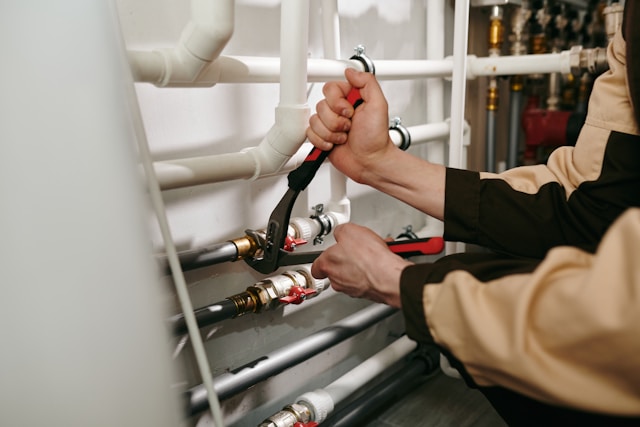Plumbing problems can disrupt your daily routine and lead to costly repairs if not addressed promptly. While some issues are unavoidable, many can be prevented with proper care and maintenance. Here are five common plumbing problems homeowners face and practical tips to prevent them.
1. Leaky Faucets
The Problem:
Leaky faucets are not just an annoyance; they can waste gallons of water and increase your water bills over time. The issue is often caused by worn-out washers, O-rings, or valve seals.
How to Prevent It:
- Regularly inspect your faucets for leaks and fix them immediately to avoid further damage.
- Replace worn-out washers or seals as soon as you notice a problem.
- Avoid over-tightening faucets, as this can cause unnecessary wear on the parts.
2. Clogged Drains
The Problem:
Clogs are one of the most common plumbing issues and can occur in kitchen sinks, bathroom drains, or toilets. They are usually caused by a buildup of grease, food particles, hair, soap scum, or foreign objects.
How to Prevent It:
- Use drain covers to catch debris and prevent it from entering your pipes.
- Avoid pouring grease or oil down the drain; instead, dispose of it in a separate container.
- Regularly flush your drains with hot water or a mixture of vinegar and baking soda to clear minor blockages.
- Be mindful of what you flush down the toilet—only flush toilet paper and human waste.
3. Running Toilets
The Problem:
A running toilet can waste hundreds of gallons of water each day, significantly increasing your utility bills. The issue is typically caused by a faulty flapper valve, float, or fill tube.
How to Prevent It:
- Periodically inspect the components inside your toilet tank for wear and tear.
- Replace the flapper valve or float mechanism as needed.
- Adjust the water level in the tank to ensure it’s not overflowing into the overflow tube.
- Use high-quality replacement parts to extend the lifespan of your toilet components.
4. Low Water Pressure
The Problem:
Low water pressure can make simple tasks like showering or washing dishes frustrating. This issue is often caused by mineral buildup in pipes, leaks, or problems with the municipal water supply.
How to Prevent It:
- Install a water softener to reduce mineral buildup in your pipes, especially if you have hard water.
- Check for leaks in your plumbing system and fix them promptly.
- Clean aerators and showerheads regularly to remove mineral deposits.
- Schedule professional plumbing inspections to identify and address underlying issues.
5. Burst Pipes
The Problem:
Burst pipes can cause significant water damage to your home and belongings. They often occur during freezing weather when water inside the pipes expands and creates pressure.
How to Prevent It:
- Insulate exposed pipes in areas prone to freezing, such as basements, attics, and crawl spaces.
- Let faucets drip during extremely cold weather to prevent pressure buildup.
- Keep your home’s thermostat at a consistent temperature, even when you’re away.
- Regularly inspect pipes for signs of wear, corrosion, or leaks, and replace them if necessary.
Conclusion
Plumbing problems can be inconvenient and expensive, but many are preventable with regular maintenance and proactive care. By addressing small issues early and following the prevention tips above, you can avoid major plumbing repairs and keep your home’s plumbing system in excellent condition.
If you’re facing persistent plumbing issues or need professional assistance, don’t hesitate to contact a licensed plumber. Regular inspections and expert advice can save you time, money, and stress in the long run. Keep your plumbing system running smoothly, and enjoy a hassle-free home!
